- Home
- Kim Newman
Professor Moriarty: The Hound Of The D’urbervilles Page 7
Professor Moriarty: The Hound Of The D’urbervilles Read online
Page 7
‘What’s this?’ the Professor indicated a detail marked with a red circle.
‘A safe, hidden behind the portrait of Rudolf III, in the private office of Colonel Sapt. If I had the key, I wouldn’t be here. I’ve been driven to associate with criminals by the need for skills in cracksmanship. You come highly recommended by Scotland Yard.’
Moriarty sniffed haughtily. ‘Scotland Yard have never heard of Professor Moriarty.’
‘For someone as crooked as you, I call that a recommendation.’
Moriarty’s head started bobbing again. He was thinking the thing through, which meant I had to look after practicalities.
‘What’s in it for us, missy?’ I asked.
‘A quarter of what I can screw from the Elphbergs.’
‘Half.’
‘That’s extortion!’
‘Yes,’ I admitted with a wink. ‘We’re extortion men, you might say. Half.’
She had a little sulk, made a practiced moue, shimmied her chest again, and bestowed a magnificent smile which warmed my insides. At some point in this business, I knew the old BMS would be required.
‘Deal,’ she said, sticking out a tiny paw to be shaken.
I should have shot her then and there.
II
The Ruritanian Embassy is a mansion in Boscobel Place. Belgravia fairly crawls with embassies, legates and consulates. The streets throng with gussied-up krauts strapped into fancy uniforms, tripping over swords they wouldn’t know what to do with if a herd of buffalo charged them. I’ve no love for your average Johnny Native, but he bests any Frenchy, Sausage-Eater or Dutchman who ever drew breath. ‘Never go into the jungle with a Belgian,’ that’s my motto.
If Irene Adler had gone to a run-of-the-mill safe-breaker like that cricket-playing fathead [5], the caper would have run to after-midnight window-breakage and a spot of brace-and-bit boring, with perhaps a cosh to Colonel Sapt’s dome as an added extra.
Moriarty scorned such methods as too obvious and not sufficiently destructive.
First, he wrote to the Westminster Gazette, which carried his angry letter in full. He harped on about the sufferings of the slum-dwellers of Strelsauer Altstadt – some of which weren’t even made up, which is where the clever part came in – and labelled Ruritania ‘the secret shame of Europe’. More correspondence appeared, not all from the Professor, chiming in with fresh tales of horrors carried on under the absolute monarchy of the Elphbergs. A long-nosed clergyman and an addle-pated countess formed a committee of busybodies to mount a solemn vigil in Boscobel Place. The protest was swollen by less dignified malcontents – Ruritanian dissenters in exile, louts with nothing better to do, crooks in Moriarty’s employ.
Hired ranters stirred passers-by against the vile Ruritanian practice (invented by the Professor) of cleaning the huge cannons of Zenda Castle by shoving little orphan girls into the barrels and prodding them with sticks until their wriggling wiped out the bore. A few of the Conduit Street Comanche – that tribe of junior beggars, whores, pickpockets and garrotters whose loyalty the Professor had bought – got themselves up as Zenda Cannon Girls, with soot on their faces and skirts, and threw dung at anyone who so much as dared step outside the Embassy.
After typical foreign bleating and whining, Scotland Yard sent two constables to Boscobel Place to rap truncheons against the railings and tell the crowd to move along quietly. To the Comanche, a bobby’s helmet might as well have a target painted on it. And horse dung is easily come by on the streets of London.
So, within three days, there was the makings of a nice pitched battle outside the Embassy. Moriarty and I took the trouble to stroll by every now and then, to see how the pot was boiling.
Hawk-eyed, the Professor spotted a face peering from a downstairs window.
‘That’s Sapt,’ he said.
‘I could pot him from here,’ I volunteered. ‘I’ve a revolver in my pocket. It’d be a dicey shot, but I could make it.’
Moriarty’s head wavered. He was calculating odds.
‘He would only be replaced. We know who Sapt is. Another secret police chief might not be such a public figure.’
My right hand was itching and I had a thrill in my water.
I had a notion to haul out and blast away, just for sport and hang the scheme. There were enough bearded anarchists about to take the blame. Sometimes an idea takes your fancy, and there’s nothing to do but give in.
Moriarty’s bony hand was on my wrist, squeezing. Hard.
His eyes shone. Cobra eyes.
‘That would be a mistake, Moran.’
My wrist hurt. A lot. The Professor knew where to squeeze. He could snap bones with what seemed like a pinch. He let me have my hand back.
Moriarty rarely smiled, and then usually to terrify some poor victim. The first time I heard him laugh, I thought he had been struck by deadly poison and the stutter escaping through his locked jaws was a death rattle. That day’s Times report from Ruritania solicited from him an unprecedented fit of shoulder-shaking giggles. He wound his fingers together like the claws of a praying mantis.
The prompt for this hilarity was Black Michael’s vow to free the Zenda Cannon Girls.
‘Let us wish him luck in finding them,’ the Professor said. ‘How delicious that the duke should be our staunch ally in this enterprise. Then again, Queen Victoria has also expressed sympathy for our imaginary orphans.’
Flashes came from the Embassy. My hand was on my revolver.
‘More photographs,’ the Professor said. ‘Colonel Sapt’s hobby.’
Sapt’s face was gone, but a box-and-lens affair was pressed against the window. Moriarty and I had coats casually pulled up over our faces, against the wind.
‘The Secret Police Chief likes to know his enemies, Moran. A man in his position collects them.’
‘Why’s Sapt in London anyway? Shouldn’t he be cracking down on bomb-throwers on his home turf?’
Moriarty pondered the question. ‘If we are to believe Miss Adler, Sapt can best serve his cause here.’
‘His cause?’
‘Up the Red, down the Black. But the Elphberg brothers are halfway across Europe. So, Sapt’s attention is directed here on subtler business.’
‘The woman?’
Moriarty’s shoulders lifted and dropped.
‘The old goat probably hopes she’ll give him a tumble to get her snaps back,’ I suggested. ‘I’ll wager he pulls the pics out of the safe every night and gives ’em a proper looking over.’
‘If that were the case, she wouldn’t have engaged us. Miss Adler does not strike me as a lady who likes to share. Yet she has willed over half the earnings of a profitable enterprise to us.’
‘No choice, Moriarty. Who else could get her what she wants?’
The Professor tapped his teeth. ‘No one but us, Moran. Evidently.’
Moriarty’s fingers went to his watch pocket. In my years of association with the Professor, I never saw him pull out the timepiece I presume anchored the chain across his flat middle. Once an associate understood the import of timekeeping, everything went to schedule. Otherwise, there might have been consequences.
He had barely stroked his chain when Filthy Fanny dashed from the crowd and began kicking the police guard.
Fanny had been successfully presenting herself as a ten-year-old waif for a full two decades without anyone being the wiser. It was down to the proper application of dirt, which she arranged on her face with the skill other tarts devote to the use of paints and powder.
Now, Filth wore the sooty skirts of a Zenda Cannon Girl. And heavy shin-kicking clogs.
She harangued in backslang (‘Reggub the Esclop!’) that sounded mighty like Ruritanian, or whatever heathen tongue they use. [6]
After some painful toe-to-shin business, the plod got his truncheon out.
With a command of the dramatic that would put a Drury Lane tragedienne to shame, Filth tumbled down the Embassy steps, squirting tomato juice from a sponge clapped ove
r her eye.
Moriarty handed me a cobblestone and pointed.
I threw the stone at the gawking copper, and fetched off his helmet. I’d once brought down a Bengal tiger with a cricket ball in exactly the same manner.
Then, the mob rose and rushed the Embassy. Moriarty hooked me with an umbrella handle and we milled in with the crowd.
The front doors caved, and the first rush of intruders slid about on the polished marble foyer floor like drunken skaters. Three guards tried to unscabbard sabres, but the Comanche set about stripping them – and the environs – of anything redeemable. Pawn-shop windows would soon display cuirasses, plumed helms and other items stamped with the Elphberg Seal.
Sapt poked his head out of his door. Moriarty signalled. A couple of bruisers laid hands on the Secret Police Chief.
The Professor sidled next to the anarchist with the biggest beard and suggested he draw up a list of demands, phrasing it so the fellow would think the whole thing was his idea.
Sapt looked about furiously, moustache twitching. Dirty hands held him fast.
A bunch of keys rattled on Sapt’s belt. Moriarty pointed them out, and an urchin brushed past, deftly relieving Sapt of the keys.
‘Give him a taste of what the Cannon Girls get,’ I shouted.
We left the mob happily shoving the Police Chief feet-first up the nearest chimney. The anarchist had posted lookouts at the doors, and was waving an ancient revolver at the still-surprised constables.
‘You can’t rush us,’ Comrade Beard said. ‘This Ruritanian territory is claimed by the Free Citizens’ Committee of Strelsauer Altstadt. Any action against us will be interpreted as a British invasion.’
The average London crusher [7] isn’t qualified to cope with an argument like that. So they bullied someone into making them tea, and told the anarchist to hang fire until someone from the Foreign Office turned up. In return, Beard promised not to garrotte any hostages just yet.
Sapt, it appeared, had got stuck.
With all this going on, it was a simple matter to slip into Sapt’s private office, take down the portrait and open the safe. It contained a thick, sealed packet – and, disappointingly, no cash box or surplus crown jewels. Moriarty handed me the goods, and looked about, brows knit in mild puzzlement.
‘What? Too easy?’
‘No, Moran. It’s just as I foresaw.’
He locked the safe again.
There was a clatter of carriages and boots outside. Boscobel Place was full of eager fellows in uniform.
‘They’ve called out the troops.’
‘Time to leave,’ the Professor said.
Back in the foyer, Moriarty gave the nod. Our Comanche confederates left off pilfering and detached themselves from those still intent on making a political point.
Sapt had fallen head first out of the chimney, sooty as a sweep. The Professor arranged the surreptitious return of his keys.
We left the building as we came, through the front door.
The Comanche melted into another crowd.
I came smack face to face with a junior guards officer, who was about to set diplomacy aside and invade. I stiffened my neck and snapped off a salute, which was smartly returned. Once you’ve worn the colours, they never wear off.
‘Carry on, Lieutenant,’ I said.
‘Yes, sir,’ he responded.
As often, Moriarty had contrived not to be noticed. Like those lizards who can blend into greenery, he had the knack of seeming like a forgettable old stick, someone who has got off the omnibus two stops early and wandered into a bloodbath which was none of his doing.
We strolled away from the battle. Shouts, shots, thumps, crashes and bells sounded. Nothing to do with us.
A cab waited on the corner.
III
Moriarty was in a black thinking mood. He chewed little violet pastilles of his own concoction – a substitute for the cigarettes which had yellowed his fingers and teeth but were now abandoned because he’d taken it into his head to deem tobacco a threat to human health – and paced his room, hands knotted in the small of his back, brow set in a crinkled frown.
I was still full of the thrill of jizzwhackery, and minded to pop downstairs to call on Flossie or Pussie or whatever the tiny blonde with the lazy eye said she was called. After the hunting grounds, the boudoir. I’d learned that in India, along with how to keep an eye on your wallet in the back of your trousers while they’re draped over a chair. Fifi. Her name was Fifi. She really was French. And she had a friend. Véronique.
But the Professor was preoccupied.
The evening papers were in, along with tear-sheets of fuller reports that would be in tomorrow’s editions. Sapt was claiming that dangerous Ruritanian revolutionary movements needed to be exterminated. He called upon Great Britain, Ruritania’s ancient ally, to join the crusade against insurrection, alleging that the assault upon the Embassy (and his person) had been equally an insult to Victoria and Rudolf. Typical foreign sod, wanting us to fight his battles for him.
Back in Streslau, there had been street skirmishes between Michaelists and Rudolfites. Many arrests had been made and Sapt was expected to return to his country with information which would lead to a complete sweep of the organised troublemakers.
The packet of photographs lay on our bureau. It seemed that reclaiming this property of a lady had interesting side effects. Moriarty’s imaginary revolution had genuinely to be put down.
‘I hope the blasted country don’t go up in flames before Irene can cash these chips, Moriarty. She’ll get no blackmail boodle out of ’em if they’re hanging from lamp posts in the public gardens.’
Moriarty growled. He left the room, and closeted himself in the dark, buzzing space where he raised his wasps and plotted the courses of heavenly bodies.
Speaking of heavenly bodies, my eyes went to the packet.
The seal was nice and red and heavy and official.
I remembered the line of Irene Adler’s throat, the trim of her calves under silk, the swell of...
No one had said anything about not examining the merchandise.
I listened out: Moriarty was whistling to his wasps, likely to be absorbed for hours; there was no tread on the stair and Mrs Halifax was ordered to keep all callers away. So, no chance of interruption.
I sat at the bureau, and turned up the gas lamp to illuminate the blotter.
With a deft bit of penknifery, I lifted the seal intact so it could be reattached with no one the wiser. My mouth was dry, as if I’d been in a hide for hours, watching a staked-out goat, awaiting the pad of a big cat. I poured a healthy snifter of brandy, an apt accompaniment to this pleasurable perusal.
With a warm pulse in my vitals, I slid the contents out of the packet.
It was like iced water tipped into my lap.
There were photographs. Views of Zenda Castle, with figures on the battlements. One wore a gauzy hat with a dead bird stuck to it, the other a comic opera uniform. Even at distance, I’d recognised the lovebirds. Irene Adler and Colonel Sapt.
‘Disgusting,’ I blurted.
A sheet of paper was slipped into the sheaf of photographs.
My Dear Col. Moran,
I knew you’d not be able to resist a peek at these ‘artistic studies’. Sorry for the disappointment.
For what it’s worth, you may keep all monies which can be raised from them. If b------l proves unprofitable, I suggest you license them to a manufacturer of postcards.
My very best to the Prof. I knew I could rely on him to toss a pebble in the pond, sending out ripples enough to make a maelstrom. An ordinary workman would just have secured the package and been done with it. Only a genius on the level of a Bonaparte could turn a simple task into the prompt for turmoil raised across a whole continent.
Please convey the thanks of another colonel. Being Chief of Secret Police in ‘one of the most peaceable, least-insurrection-blighted spots on the map’ was not a career with a future. The Elphbergs were intent on re
tiring him, but now – I fancy – he’ll be kept on with an increase in salary.
I expect you to retain the last figure for sentimental reasons, and I remain, dear Colonel Moran, very truly yours,
Irene Adler
I flipped through several more entirely innocent tourist photographs of picturesque Ruritania, until – at the bottom of the stack – I beheld the full face of the American Nightingale. In this final, studio-posed photograph she wore the low-cut bodice she’d affected on her visit to Conduit Street, somewhat loosened and lowered, though – dash it! – artistic fogging around the edges of the portrait prevented complete immodesty. Through the fog was scrawled her spidery autograph, ‘as ever, Irene’. Even thus frozen, she looked like the sort who would be much improved by a Basher Moran Special. I gulped the brandy, and chewed my moustache for a few moments, contemplating this turn of events.
Behind me, a door opened.
I swivelled in the chair. Moriarty looked at me, eyes shining – he had thought it through, and was unhappy. When the Professor was unhappy, other creatures – animals, children, even full-grown men – tended to learn of it in extreme and uncomfortable manners.
‘Moriarty,’ I began, ‘I’m afraid we’ve been stung.’
I held up Irene’s photograph.
He spat out a word.
And that was how a great shambles broke out in Belgravia, shaking the far-off kingdom of Ruritania, and how the worst plans of Professor Moriarty were exploited by a woman’s treachery. When he speaks of Irene Adler, or when he refers to her photograph, it is always as that bitch.
CHAPTER THREE: THE RED PLANET LEAGUE
I
Professor Moriarty excelled in two fields of human endeavour.
Mathematics, for one. Never was such a fellah as the Prof for chalking up sums. Or the rigmarole with more squiggles than numbers. Equations. Did ’em in his head, for fun... damn his eyes.
I would wager several pawn tickets held on the family silver that you lot have little or no interest in fractional calculus or imperfect logarithms. You’d all be best pleased if I yarned up the other field in which James Moriarty was top of the class.

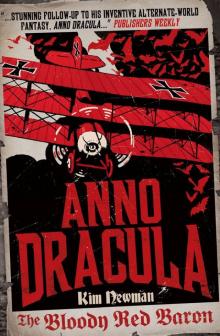 The Bloody Red Baron
The Bloody Red Baron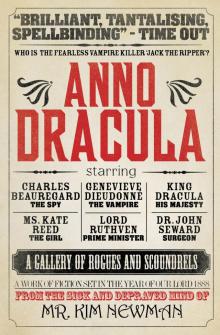 Anno Dracula
Anno Dracula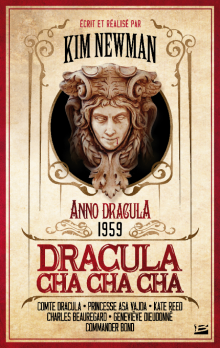 Dracula Cha Cha Cha
Dracula Cha Cha Cha Anno Dracula 1999
Anno Dracula 1999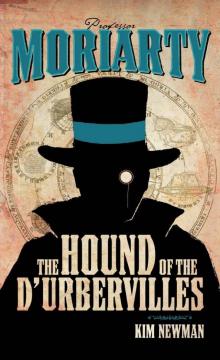 Moriarty: The Hound of the D'Urbervilles
Moriarty: The Hound of the D'Urbervilles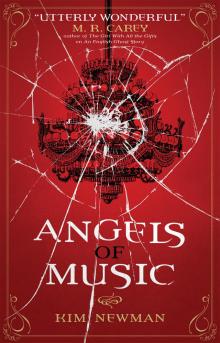 Angels of Music
Angels of Music The Man From the Diogenes Club
The Man From the Diogenes Club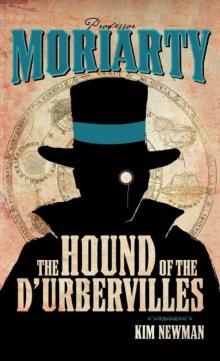 Professor Moriarty: The Hound Of The D’urbervilles
Professor Moriarty: The Hound Of The D’urbervilles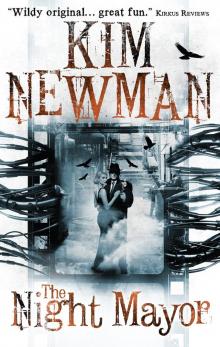 The Night Mayor
The Night Mayor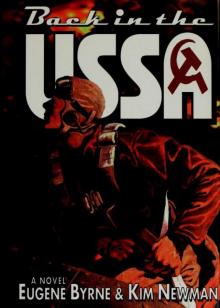 Back in the USSA
Back in the USSA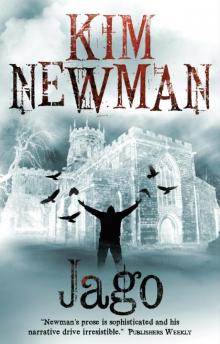 Jago
Jago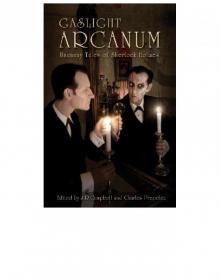 Gaslight Arcanum: Uncanny Tales of Sherlock Holmes
Gaslight Arcanum: Uncanny Tales of Sherlock Holmes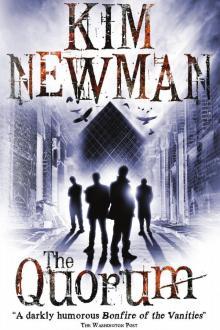 The Quorum
The Quorum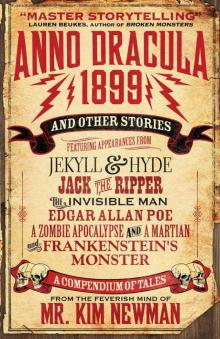 Anno Dracula 1899 and Other Stories
Anno Dracula 1899 and Other Stories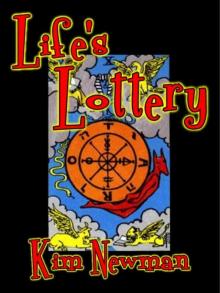 Life's Lottery
Life's Lottery The Secrets of Drearcliff Grange School
The Secrets of Drearcliff Grange School Anno Dracula ad-1
Anno Dracula ad-1 The Bloody Red Baron: 1918 ad-2
The Bloody Red Baron: 1918 ad-2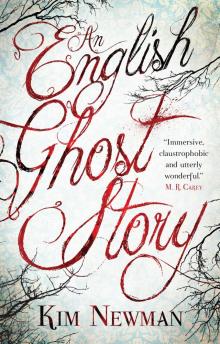 An English Ghost Story
An English Ghost Story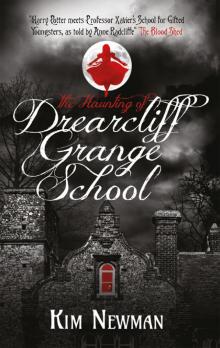 The Haunting of Drearcliff Grange School
The Haunting of Drearcliff Grange School The Other Side of Midnight
The Other Side of Midnight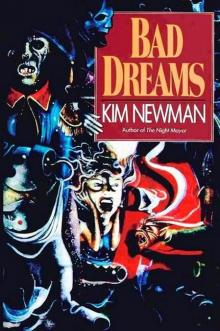 Bad Dreams
Bad Dreams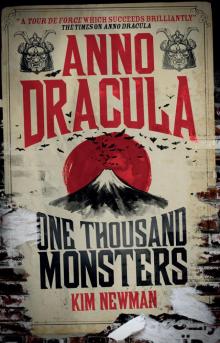 Anno Dracula--One Thousand Monsters
Anno Dracula--One Thousand Monsters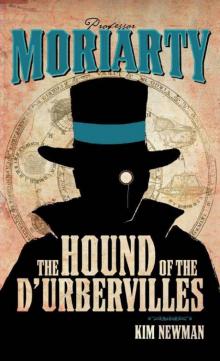 The Hound Of The D’urbervilles
The Hound Of The D’urbervilles The Bloody Red Baron: Anno Dracula 1918
The Bloody Red Baron: Anno Dracula 1918